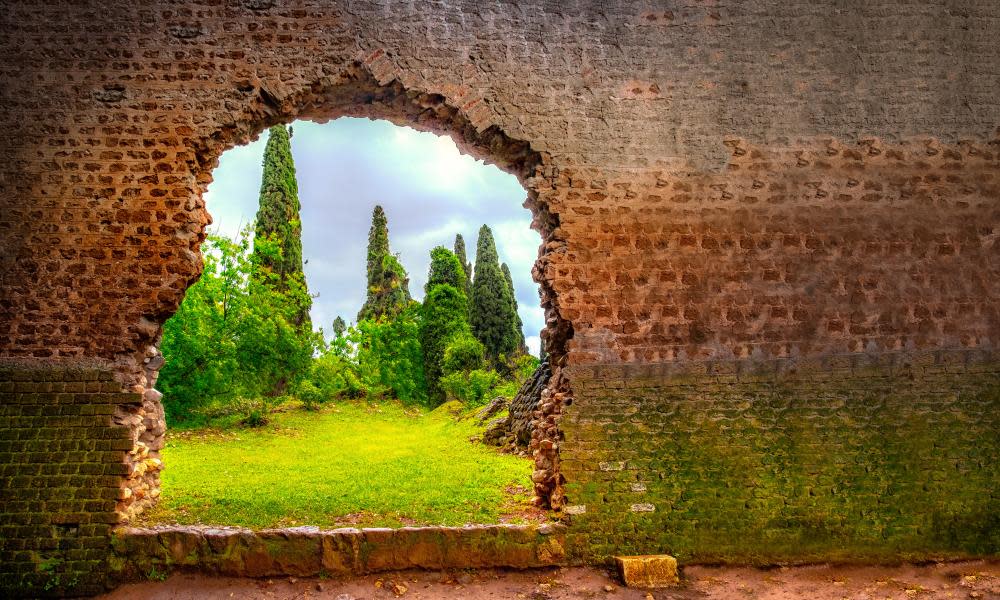eden by Jim Crace review – the world beyond the wall

Flowing rivers, gorgeous trees, bountiful crops, birds and animals to spare: Jim Crace’s latest novel is set in a lower-case, scrupulously mapped version of the Garden of Eden. There, some time after the expulsion of Adam and Eve, peace of a stilted kind reigns: the few dozen human inhabitants know they can “breathe forever without cares”, but there’s a catch – they must obey the angels. These angels have been created in the form of birds, not so much because of their beauty as for their surveillance skills. “A creature that can penetrate the sky can serve his lord and his masters anywhere.”
From an aerial perspective, the garden is a perfect circle, intricately manicured, a praise song to a higher power. On the ground, things look rather different. “Order is the order of the day.” The gardeners, who are diligent and mostly unvoiced, bake bread, clean latrines, collect vegetables and timber, plough the fields. They eat and pray together. At night they sleep in the same dormitory. The atmosphere is frugal rather than fecund: during fasting periods they’re not even allowed to swallow their spit. Ominously, the narrator describes this form of communal living as “sublime uniformity”.
Disturbing details stack up. Some of the gardeners are said to fake illnesses or hurt themselves in order to get off work. They toil in wheat fields, scrape slugs off lettuce, develop calluses, are scratched by thorns. This is less an idyll than a labour camp. Certainly, what keeps the system going is the theology that outside, beyond the walls of eden, lies both a void and a wilderness. Rumours circulate – of cannibals, ghosts, wild humans. Should eden be read as a plantation, or an empire on the brink of collapse? More broadly, do walls protect communities or are they malign structures that enact a kind of apartheid?
The novel’s suspense lies in trying to work out if there’s an insurgency in the offing. The storm comes when a woman named Tabi disappears, leaving barely a trace. She’s always been restless, “a bouncing breeze”, “the garden’s loudest mouth”. She works in the trees and is referred to as an “agitated bird”. Crace has written about his youthful enthusiasm for Jack Kerouac: Tabi often comes across as a proto-Beat. Not only does she harbour heretical thoughts during sermons, she yearns for messiness, freedom, the messiness of freedom. In a place like eden, that desire is seditious, a “mutinous contagion”. She has to be brought back.
In charge of the operation is Alum, whose job is to stock the communal larder. Because he believes “obedience is harmony”, and because he thirsts for power, he sides with the angels more than the humans. As a spy and tell-tale, he’s said to have “eyeballs in his arse”. Small wonder that the humans see him as a snivelling snitch. He broods on his own isolation, the knowledge that he has made himself an untouchable. His only salve is to imagine “the touch of seizing sisters by the wrists, the joy of striking brothers with his fists”.
Alum pursues Tabi doggedly, and secretly uses one of her admirers, an angel called Jamin, to stalk her. Blessed with stunning blue plumage, Jamin is a genial slacker, a demi-monde aristocrat, less pompous or vindictive than his fellow angels. Spotting a human in a pond, he wishes he himself could be “stripped bare of all responsibilities, all status and all piety”. He flies beyond eden’s walls to see what other worlds are possible, only to hurt a wing so badly he becomes known as a “broken angel”. The scenes in which he is groomed by Tabi (who “works against the vane but follows the shaft … She reaches places that an angel cannot reach himself”) are delightfully redolent of mid-70s Euro‑porn.
In eden Crace revisits terrain of which he has long been a memorable explorer. The Gift of Stones (1988) stretched back in history all the way to the bronze age; Quarantine (1997) was a retelling of Jesus’s 40 days in the wilderness; 2013’s Harvest, like Arcadia before it, investigated the myths and dark pasts of English ruralism. This latest novel deploys peaty, Hardy-esque language to telling effect, making the Garden of Eden a place of sweat and toil rather than a gauzy paradise. Feathers have a “musky niff”; Tabi gorges herself on apples and is left with a “pippy face”; Ebon whiles away time swiping at wasps and “mammocking” butterflies. An assiduous, vividly documented anti‑romanticism is evident on every page: pond fish are fed cyst-encrusted earthworms; Tabi goes for a pee and sends up a “smell of resin and a warm mist”; even angel feathers suffer from pod-lice, ticks and mites.
It doesn’t spoil eden to reveal that its action, grindingly slow at first, accelerates in the final third – and in convulsive, almost carnivalesque fashion. “This is a story that will be told for years to come,” declares the narrator. “A love story, a history, a tale of wisdom gained, of growing old, of treasuring what’s drawn in air as much as what is solid earth and stone.” Crace exults here in the art of storytelling, but it also reads as if he’s pulling up a drawbridge, arresting the novel too soon after its tensions have begun to be released. His characters are left stranded, not much more than pawns, their fates pre-ordained. Such is the danger with writing fables: eden, a novel about freedom, all too often feels tethered and unfree.
• eden by Jim Crace is published by Picador (£16.99). To support the Guardian and Observer order your copy at guardianbookshop.com. Delivery charges may apply.

 Yahoo Movies
Yahoo Movies 
